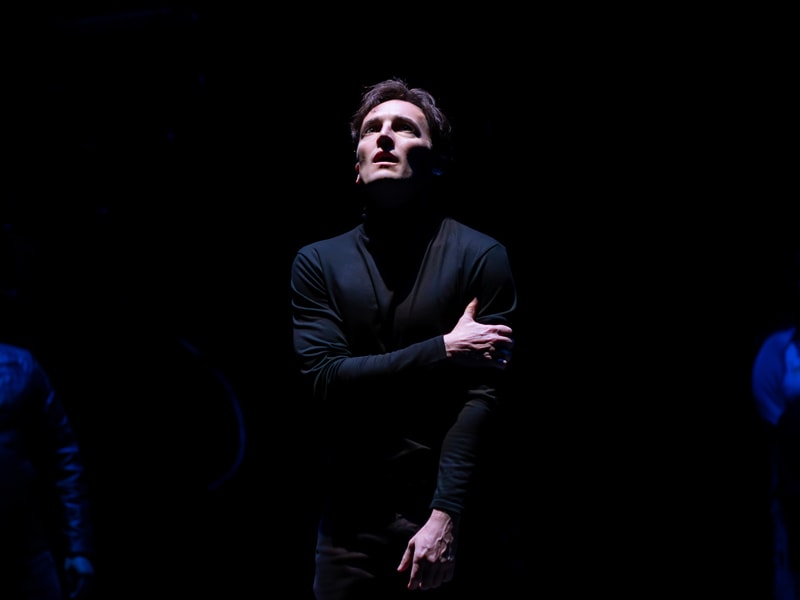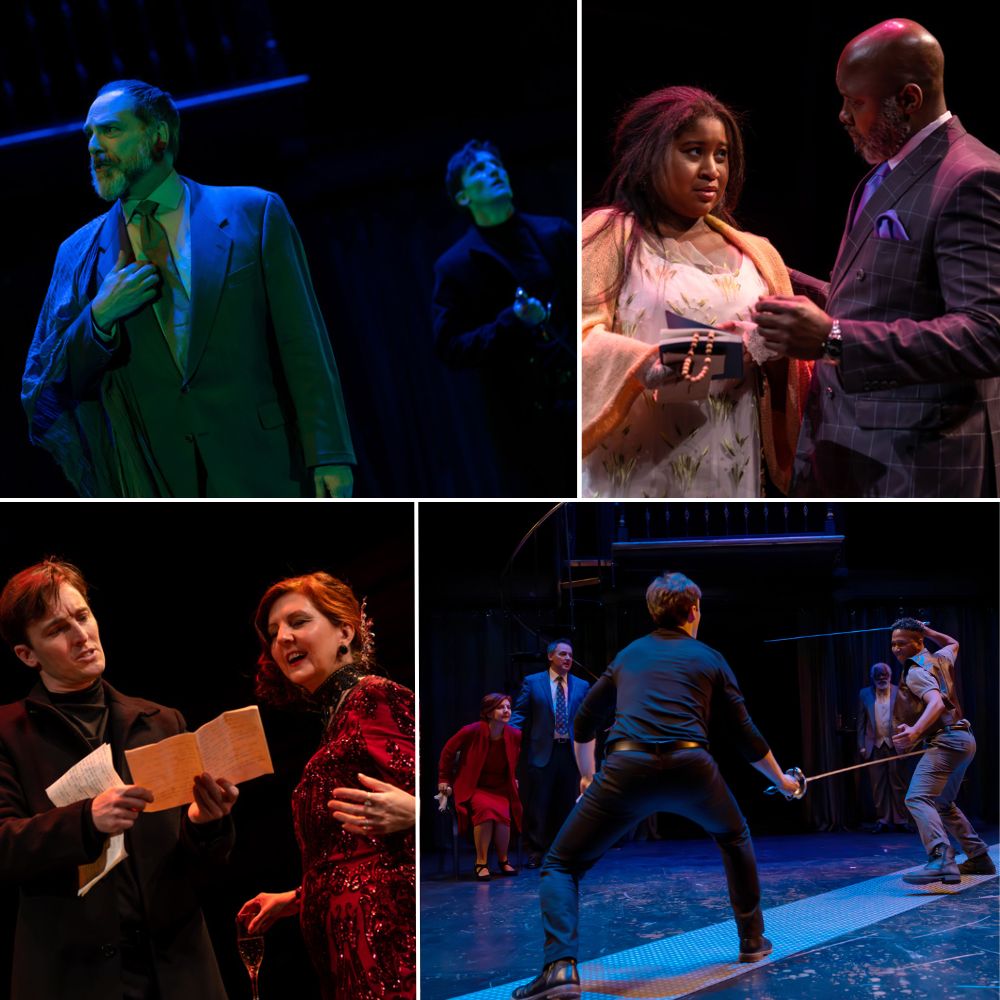In the BBC comedy Blackadder: Back & Forth, the time-traveling Blackadder (Rowan Atkinson) runs into a young Will Shakespeare (Colin Firth), giving a punch to the Bard for composing the canon that becomes the mandatory curriculum/suffering of 400 years of school students. Once Will is down, Blackadder gets in a quick kick, too, for “Ken Brannagh’s endless, four-hour, uncut Hamlet.”
Chesapeake Shakespeare Company’s current Hamlet wouldn’t warrant such a kick.
Directed by Eleanor Holdridge, it’s a sparse production (in all the best ways) — just over two hours long. The play clips along quicker than the time between King Hamlet’s funeral and the Queen’s quick remarriage to her former brother-in-law. There’s no fat, no bloat, no unnecessary archaic jokes, and barely any courtiers, guards, or hangers-on in the Danish royal court.
What we do have is Vince Eisenson as a virtuoso Hamlet leading a strong cast in Shakespeare’s great tragedy.
As Hamlet, Eisenson creates a nuanced Danish Prince: a clever, thoughtful, humorous young man — sure, a bit pretentious at times, but he is a university student returned home — confronted with a horrific discovery. We watch Hamlet uncover this murder mystery, deal with his profound grief and anger, and unravel as everything he has learned about the world — philosophy, religion, logics, and more — fails him, and he becomes just as jaded, cruel, and broken as the world around him.

Eisenson’s Hamlet is natural and effortless, turning most soliloquies into confidences with the audience. He offers a more jovial and energetic take on the Prince, who becomes melancholic only because of his circumstances; he’s witty and active, breaking into jigs while teasing Polonius. This is a Hamlet who otherwise would have fared well in one of Shakespeare’s romantic comedies. But this isn’t that story at all.
Hamlet is tasked by the Ghost of his father (David Yezzi) to confront and kill his regicidal/fratricidal uncle Claudius (a smooth-talking, cowardly Marcus Kyd, so unctuous in speech that he all but leaves a trail of slime behind). But, fate (pirates! forged letters! more than one invading army! dead bodies behind curtains to dispose!) and his own issues — mostly, turning his cruelty toward Gertrude and Ophelia — keep delaying his revenge.
The judicious cuts to the script allow the two doomed women of the play to be more present and active than in full-length productions where they have comparatively less stage time.
CSC’s Executive Director Lesley Malin plays Gertrude as shrewdly observant of what’s going on around her: she notes Hamlet and Ophelia’s flirting and is the first observer of Ophelia’s madness; she also notes her son’s odd behavior early on, and importantly, she knows what is in the drink in the final scene. Unlike her son, she sees nothing unnatural about her remarriage and seems very much in love with her new husband. But like Hamlet, she also realizes that Claudius is not the man she thought he was; we see subtle changes in her gestures toward Claudius, and a coldness sets in where before there was only warmth and affection.
Elana Michelle’s Ophelia is brilliantly realized, another bright spark of life and joy and laughter extinguished because of the men around her.
Ophelia and Hamlet break each other’s hearts when she returns his love letters (and unlike many modern productions, while Hamlet is angered and betrayed, he does not abuse Ophelia here); she is publically humiliated by his dirty jokes at her expense during The Mousetrap; and shortly after her (ex-?) boyfriend has stabbed her father, she stumbles onto a conversation about exiling the Prince to England for the murder. Michelle’s transformation into Ophelia’s madness is effectively and sadly all too real, and this innocent (but not naive) victim finally can speak to those in power in her bawdy rhymes and folk songs instead of being a pretty, good, and silent girl.
In early, easy scenes with her brother, Laertes (JC Payne), and her father, Polonius (DeJeanette Horne), Ophelia is confident and playful — teasing her protective older brother and exuding an easy love for her doting, but overbearing father. All three actors in this second imperiled family add layers to their roles.
DeJeanette Horne’s Polonius is loquacious but no fool, knowing that there are political games to be played even if he doesn’t know all the rules or hold all the cards. He also seems to have his children’s best interests in mind (especially when it furthers his own career). And JC Payne as Laertes transforms from an easygoing guy to a rebel ready to overthrow the whole damn monarchy after his father’s murder. He is quick to action, full of fire and anger. This is his revenge tragedy, too, and in his final moments, Payne’s final exchange with Hamlet gives this penultimate death even more gravitas.
This Hamlet is lean, energetic, and powerful, but not without humor. And it’s not Hamlet’s antic disposition that brings all the laughs. Dagan Brown and Briana Manente play the hapless, high-octane college chums Rosencrantz and Guildenstern; Brendan Edward Kennedy offers a little levity as Hamlet’s often bewildered buddy Horatio, who doesn’t understand this royal court with its murders and ghosts and multiple revenge plots; and in a scene-stealing turn, Gregory Burgess is fantastic as the literal-minded Gravedigger while Dawn Thomas Reidy as the second Gravedigger sullenly eats her lunch and silently passes judgment on Hamlet’s highfalutin’ ways.

The quick pace of play is aided by a spare aesthetic. Designed by Misha Kachman, the set is simple — black floors, a black spiral stair leading to the black balcony; occasionally a chair, loveseat, or bar cart is brought on stage and removed again. Props (by Caitlin Bouxsein) are minimal — a love letter, a book, a dagger, a poisoned drink. Designed by Katie McCreary, the lighting choices are more bold: a globe light descends when Hamlet advances part of his stratagem; a thundering cloud glowers above and changes colors during climatic scenes. Costumes (by Gail Beach) are contemporary and simple, and except for a flashy, red-sequined gown worn by Gertrude for a state event and Ophelia’s penchant for romantic florals, they are examples of quiet luxury, showing the wealth and power of these Danish players.
And the efficiency of the play’s cuts and simplicity also highlights some of the play’s most brilliant moments, too. The opening scenes are somewhat reordered for clarity and begin with Hamlet’s “To be or not to be” soliloquy being drowned out by the other characters entering the fray and speaking their own lines (don’t worry: it’s repeated later in its entirety). The final duel between Hamlet and Laertes (staged by Kristen Pilgrim) is fast-paced and thrilling. Due to the sparse cast, Hamlet gives the infamous parts of The Mousetrap to Gertrude and Claudius, so as the Player Queen and King, they reenact their sins in front of the royal court. It’s a brilliant choice. But there are minor missteps: for some soliloquies, the stormcloud flashes, the lighting pales to an ill green, and an electric buzz hisses behind Hamlet’s famous words. Yes, it physicalizes Hamlet’s thoughts, but it’s not needed, nor is the staging of “To be or not to be” where Hamlet sits still in a chair during the entire speech, frozen by his thoughts, when Eisenson is such a balletic performer.
This is a sharp, excised, and poignant production of Hamlet — the kind that even Blackadder or the most Shakespeare-adverse would enjoy, one that would enthrall young students rather than bore them out their minds, that speaks the speech trippingly but also knows when actions speak louder than words, words, words.
Running Time: Two hours and 15 minutes, plus one 15-minute intermission.
Hamlet plays through May 21, 2023, at Chesapeake Shakespeare Company, 7 South Calvert Street, Baltimore, MD. Tickets are $23–$69. Subscriptions and tickets can be purchased by calling 410-244-8570, ordering online, or visiting the Box Office in person. For more information or to purchase tickets, click here.
COVID Safety: Chesapeake Shakespeare Company no longers require that patrons wear masks for performances at its Downtown Baltimore theater. However, socially distanced seating options are available and must be purchased by calling the Box Office.
Hamlet
By William Shakespeare
Directed by Eleanor Holdridge
CAST
Vince Eisenson – Hamlet
Lesley Malin – Gertrude
Marcus Kyd – Claudius
DeJeanette Horne – Polonius
Elana Michelle – Ophelia
JC Payne – Laertes
David Yezzi – Ghost/Player King
Gregory Burgess – Gravedigger
Dawn Thomas Reidy – Fortinbras
Brendan Edward Kennedy – Horatio
Dagan Brown – Rosencrantz/English Captain
Briana Manente – Guildenstern
CREATIVE TEAM
Eleanor Holdridge – Director
Jalice Ortiz-Corral – Stage Manager
Sarah Curnoles – Production Manager
Dan O’Brien – Technical Director
Chester Stacy – Assistant Technical Director
Misha Kachman – Scenic Designer
Katie McCreary – Lighting Designer
Gail Beach – Costume Designer
Scott Killian – Sound Designer
Caitlin Bouxsein – Props Designer
Melissa Flaim – Text and Vocal Coach
Kristen Pilgrim – Fight Choreographer
Eva Hill Assistant – Stage Manager
Hannah Brill – Wardrobe Supervisor
Kristopher Ingle – Light Board Operator
Mandy Benedix – Covid Safety Officer
Pam Forton – Senior House Manager




